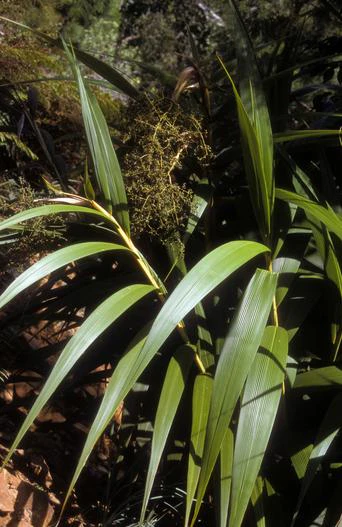Ohe
(Joinvillea ascendens)
Ohe (Joinvillea ascendens)
/
/

Scott Zona
CC BY 2.0
Image By:
Scott Zona
Recorded By:
Copyright:
CC BY 2.0
Copyright Notice:
Photo by: Scott Zona | License Type: CC BY 2.0 | License URL: https://creativecommons.org/licenses/by/2.0 | Uploader: File Upload Bot (Magnus Manske) | Publisher: Wikipedia Commons




Estimated Native Range
Climate Requirements for Lake Jackson, Texas
| This Plant | Your Site | Plant Suitability for Your Location | ||
|---|---|---|---|---|
| • Precipitation | 29" - 189" | 54" | Aquatic | Aquatic |
| • High Temp. | 70°F - 86°F | 91°F | Your summers may be too hot for this plant. | Too hot |
| • Low Temp. | 47°F - 70°F | 44°F | Your winter temperatures may be too cold for this plant | Too cold |
This plant should grow well at your location with about N inches per year (Y minutes per month) of irrigation.
Summary
Joinvillea ascendens, commonly known as Ohe or Joinville, is a perennial herb native to the understory of tropical rainforests in the Pacific Islands, including Fiji, Samoa, and Tonga. It exhibits a moderate growth rate and can reach a height of 15-25 feet (4.6-8 meters) with a width of 8-12 feet (2.4-3.7 meters). This plant features large, glossy green leaves and produces small, inconspicuous flowers. Although the flowers are not particularly showy, the foliage of Joinvillea ascendens adds a lush, tropical feel to any garden setting.
Joinvillea ascendens is valued for its ability to create a dense, leafy backdrop in shaded garden areas, making it an excellent choice for underplanting beneath taller trees or as a privacy screen. It is also suitable for creating a tropical effect in conservatories or as an indoor plant in large spaces. In cultivation, it requires part shade to mimic its natural understory habitat. It thrives in medium draining loam soils and needs consistent moisture, though it is important to avoid waterlogging. While it is generally low-maintenance, it may be susceptible to pests such as spider mites and mealybugs when grown indoors or in dry conditions.CC BY-SA 4.0
Joinvillea ascendens is valued for its ability to create a dense, leafy backdrop in shaded garden areas, making it an excellent choice for underplanting beneath taller trees or as a privacy screen. It is also suitable for creating a tropical effect in conservatories or as an indoor plant in large spaces. In cultivation, it requires part shade to mimic its natural understory habitat. It thrives in medium draining loam soils and needs consistent moisture, though it is important to avoid waterlogging. While it is generally low-maintenance, it may be susceptible to pests such as spider mites and mealybugs when grown indoors or in dry conditions.CC BY-SA 4.0
Plant Description
- Plant Type: Herb, Shrub
- Height: 15-25 feet
- Width: 8-12 feet
- Growth Rate: Moderate
- Flower Color: White
- Flowering Season: Spring, Summer, Fall, Winter
- Leaf Retention: Evergreen
Growth Requirements
- Sun: Part Shade
- Water: Medium
- Drainage: Medium
Common Uses
Potted Plant
Natural Habitat
Native to the understory of tropical rainforests in the Pacific Islands, including Fiji, Samoa, and Tonga
Other Names
Common Names: Joinville
Scientific Names: Joinvillea ascendens, Joinvillea ascendens, Joinvillea gaudichaudeana, Joinvillea gaudichaudiana
GBIF Accepted Name: Joinvillea ascendens